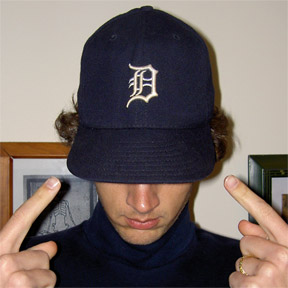Go Break Yer Brain on Infinity
Here's a math problem that's new to my biological brain.
Does 0.999999... (0.9 repeating) equal 1?
I might normally say, of course not, but reading this entry at Polymathematics, a math blog I just stumbled upon, has me leaning the other way. On first consideration, it seemed impossible to me that 0.999999... could equal 1. It is close to 1 but a little bit smaller, no?
Well, here is what has me changing sides: a little series of equations added together. The first two equations lead me inevitably to the final one.
1/3 = 0.333333...
2/3 = 0.666666...
3/3 = 0.999999...
I know that 3/3 = 1. So 1 must equal 0.999999...
Or how about this: Imagine you could take a pizza and divide into it three perfectly equal slices. Each would be 1/3, or 0.333333..., of the pizza. Add 'em together and what do you get?
It seems proven to me, yet it still feels wrong, and I can't help but wonder if it hints at some problem that stems from describing the universe in human, mathematical terms.
I've written and rewritten this portion of this post to no satisfying end, so I'll just get to the heart of the matter: My brain can't handle things like repeating decimals, or infinite time, or boundless space. These things just don't exist for me, and I find it hard to imagine how they could exist in the universe.
As one commentor at Polymathematics notes: "Our intuition plays a much larger part in our everyday reasoning than we normally notice - and that's not a bad thing...However, it was never designed for reasoning on infinity or other weird mathematical phenomena."
What it comes down to for me is that 0.999999... is a strange animal. If I think of things out in the world, I can imagine 9 of them, or one of them, or 1/2 (0.5) of them, but I can't imagine 0.999999... of them. It just doesn't fit comfortably in my brain. I picture some continuous operation: some person writing out and endless series of nines, or trying to locate the number on a numberline, and always having to shift ever-so-slightly more to the right. My brain scrapes up against the infinite.
But then I think on some level all this worry is silly. (Want to see really silly worry? Check out the insanely long comment section in the original Polymathematics post.) I know repeating numbers are real, just like I know 1/3 is real. So the fact that it seems infinite must be a quirk of the base 10 numbering system.
Yet on a more philosophical level, I find myself circling back to this notion that simple problems like this reveal a profound disconnect between mathematics and the real world. Math has a lot of power to describe the world, but it is just a tool. I don't think it is somehow hooked in to reality.
This is one reason I become exasperated when physics snobs denigrate biology, suggesting that only when a science is expressed in mathematics is it sufficiently rigorous. Why expect math to be a perfect tool for describing the world?


4 comments:
Dude, this stuff is way over my head!
I don't know nothin' bout no numeratin', but it seems to me that 1/3 is not really the same as 0.333333.... for the same reason that 1 is not the same as 0.999999....
0.333333.... is only the closest approximate decimal representation for 1/3, right? It's generally accepted to be the same, but when you get technical, it's actually a little smaller, no?
Am I wrong? Again, I'm no math theorist...
I'm also no mathemoid, but 0.333333... does not approximate 1/3, as far as I can tell. It is equal to it. An approximation would end, say 0.333, but the number we are considering repeats. If you don't believe it, do the long division: divide 1 by 3. I think you'll find you have a repeating answer on your hands. That's a real number that is just hard to handle in our numbering system.
Damn! This maths problem is blowing up!
http://www.guardian.co.uk/Columnists/Column/0,,1803028,00.html
Post a Comment